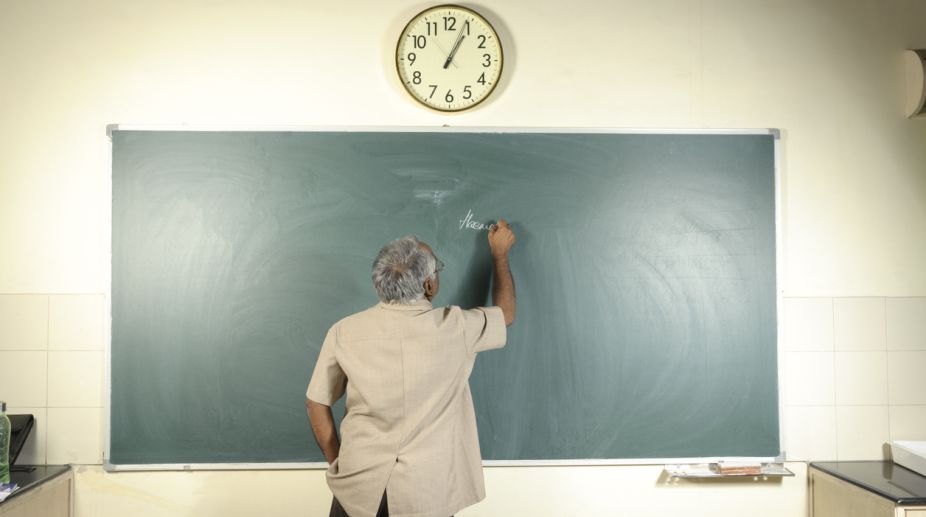Don’t sell your books and keep your diplomas. Sell your diplomas, if you get anyone to buy them, and keep your books. ~ Walter B Pitkin
In this censure of the examination system, Pitkin obviously referred to the obsession with degrees. This is linked to the private tuition racket that begins at the very elementary level. Private tuition has become a malaise in the education system; it can well be diagnosed as incurable, especially in West Bengal. From the primary to college and university levels and for all the competitive examinations and important entrance tests, it is often deemed as a necessary evil.
Advertisement
This was documented nearly a decade ago by the Annual Status of Education Report, prepared by an NGO and the Central Government. It revealed that whereas in the rest of the country 24 per cent of those studying up to Class VIII are tutored privately, in West Bengal this number is as high as 88 per cent.
According to a 2004 report crafted by the National Sample Survey Office and titled “Key Indicators of Social Consumption in India’s Education”, one out of every four students in the upper primary level are dependent on private tuitions. In West Bengal, the number is even higher than the national average ~ three out of five students attend private coaching classes. Success is measured in terms of academic performance, and most students have to contend with pressure at home and schools and with private tuition. With exams taking the form of an inquisition, where rote learning is emphasised at the cost of creativity and reasoning, our education system is better equipped to produce parrots rather than scholars. Success has, of late, become directly proportional to the amount of money one spends on the private tutorial home.
The tension over admission whether to a primary school or college, the relentless parental pressure, the constant phobia of failure have resulted in overwhelming insecurity. The demand to perform and conform begin early ~ for toddlers to get into an elite school, for Plus Two students to get into a career-oriented institution. For landing the perfect job and achieving ultimate success, there are irresistable offers of “assured success” if the student attends a coaching class.
The structure of the syllabus and the lack of adequate and efficient teachers have facilitated the private tuition racket. Different tutors are approached for different subjects. With more and more students enrolling themselves in tutorial classes, people from other professions also double up as private tutors because it is a lucrative business.
The system “catches them young”. The three-year-old toddlers are dragged from nursery schools to tutors who will prepare them for admission to “good” schools. Their parents also attend classes that instruct them on how to cope with school interviews. Private tutors readily exploit the situation, thereby corrupting the very ethics of their profession as well as the academic environment. This parallel system of education naturally comes to be prized by parents who want for their wards to possess skills that would bring them to the threshold of successful careers in a globalised economy.
Not that private tuition is a recent phenomenon. Several intellectuals including Rabindranath Tagore did not attend any regular classes, but they studied only with the help of private tutors. Even Professor SC Sengupta, the distinguished scholar, used to provide private tuition to Lady Ranu Mukherjee’s daughter. The ability to pay has improved over time, and unscrupulous characters, who may not necessarily be teachers, are making hay. A rat race to make easy money has denuded the noble profession of teaching. The readymade study materials, often printouts from the Net, deter the students from attending regular classes. Some years ago, the Principals of colleges in West Bengal had urged the then higher education minister to compel students to attend classes. The emphasis on teaching has shifted from human resource “development” to “management”. Students are happy with suggestions and photocopies of notes instead of studying on their own. The minimum effort is lacking.
Private tuition not only creates a parallel education system, but it distorts the normal learning process as well. The syllabus is reduced to a set of notes. In such circumstances, the student is not in a position to learn. In How to Read a Book, Mortimer J Adler writes: “Perhaps we teachers were more honest about our reading disabilities, we might get the students disinterested in the game of learning instead of in the game of passing”.
The state government’s occasional announcements to ban private tuition are only for the birds. In 2001, private tuition was banned by the school education department. Teachers of both government and government-aided schools were asked to submit an undertaking before their appointment that they won’t give private tuition. The school authorities also were to submit a similar statement . A resolution to stop private tuition was passed by the West Bengal College and University Teachers’ Association in 1992. The members planned to appeal to teachers to discontinue their tutorial classes and place the issues before the public and make both teachers and students aware about the disadvantages of this practice. The changes required in the syllabus and teaching methods and the preparation of a question-bank at the graduate and post-graduate levels were among the priorities. In some schools, there is a rule that all requests for tuitions for ‘weak’ students must go through the school authorities. Such rules are generally flouted.
Even if teachers give up private tuition, the parallel coaching centres run by the educated unemployed youth will almost certainly continue to flourish. Only if there is a change in the attitude of parents, teachers and students, can we gradually rid ourselves of what has been described as the “tuition tyranny”. It destroys self-confidence and the ability of the student to think independently. Education is merely spoon-feeding. Noticeable is the general slackness and dislike of unnecessary exertion.











